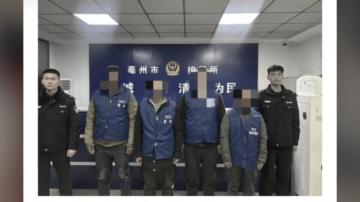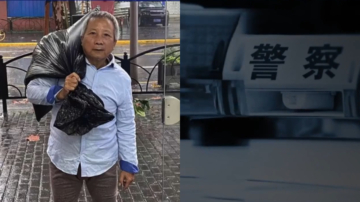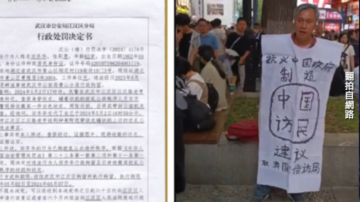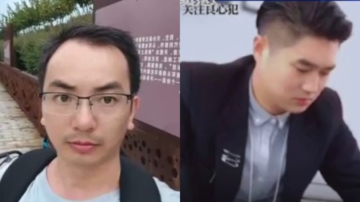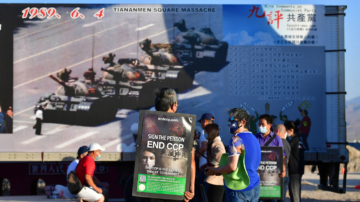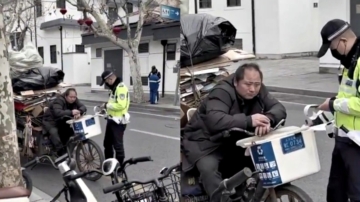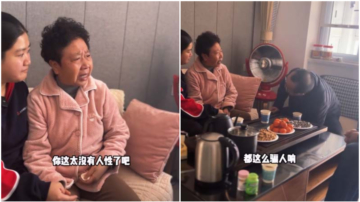【新唐人2013年01月18日訊】週三,原《北京電視臺》主持人胡紫薇在博客上披露,她在5年前被解聘工作的內幕。再次將中共新聞審查制度及閱評員不法的罪行,推上輿論的焦點,引發大陸媒體人的共鳴及輿論的抨擊。
1月16號,胡紫薇在博客中說,2007年8月,她擔任製片人的欄目中,報導了一則新聞:是在她出差期間,接了一大媽的投訴電話,這位大媽購買了一台名牌冰箱,結果製冷系統出了問題,廠家沒有幫她解決,欄目組幫忙找到廠家的售後部門,給大媽修好了。
但是,這則新聞卻令胡紫薇被撤銷了製片人職務,還被辭去了北京電視臺主持人工作。
胡紫薇透露,當時正是奧運會倒計時週年,《北京電視臺》被要求停止所有批評報導。閱評員定性這則新聞是批評報導,並指稱,這則名牌冰箱的報導,是不負責任的抹黑民族品牌,導致這家品牌的產品在歐洲國家銷售不暢和退貨情況,對中國民族企業產生了不良影響,是錯誤的媒體導向。
胡紫薇的博客發出後,引發輿論的關注和大陸媒體人的共鳴。原《陝西電視臺》記者馬曉明指出,在中共嚴厲的新聞審查制度下,有許多媒體人遭遇類似事件被撤職。
原《陝西電視臺》記者 馬曉明:502「我本身就是一個,因為在89民運期間,在我主持的節目裡頭,發了一些信息,被定罪為嚴重違反了黨的宣傳紀律,就被一落到底,就連編輯的資格都被撤消了。」
原《河北人民廣播電臺》編輯朱欣欣:「中國因為沒有新聞法,當局完全按著他們的潛規則,他們內部的尺度,來隨意的定人罪名,這完全是一種法西斯黑社會的做法,閱評員說白了就是我們大家常說的五毛黨,他所幹的就是罪惡的、醜陋的勾當。」
胡紫薇披露,閱評員都是由退下來的所謂資深媒體人構成,他們一輩子被管束壓抑扭曲,但是在風燭殘年,他們仍然甘之如飴的領受著毀了他們一生的那個勢力的召喚,主動的把自己的餘生,跟這個原本應該深惡痛絕的醜惡捆綁在一起,跪求豢養。
她還提到,當時辭退她的總編輯,後來因為其他原因,也離開了工作崗位。她感嘆:在一個狼奔豕突的社會裡,大家都是自求生路的可憐蟲,或早或晚,大家都會付出代價。
自由撰稿人劉逸明指出,胡紫薇的遭遇,在中國媒體人中很有代表性。
自由撰稿人劉逸明:「在中國因為閱評員的誣告,亂定性,導致被迫下崗的媒體人,肯定還有很多很多,以前有,現在的話,還會繼續有,她肯定不是最後一個,(047)我們大家所知道的一些體制內的媒體人,(知道)被迫離職的鳳毛麟角,還有很多因為做了比較客觀真實的報導,被迫離職的媒體人士。」
原《河北人民廣播電臺》編輯朱欣欣指出,閱評員實際上是潛伏在言論新聞界的特務,是中共維穩體系鉗制言論,迫害新聞自由的一個重要環節,它對整個民族是個極大的摧殘和壓抑。
朱欣欣:337「對於這些閱評員,大家也要『人肉』把他們都找出來,把他們的罪惡都記住,將來會給他們清算的,不能讓他們作惡了,逍遙法外,要記住他們,把他們列入罪惡的黑名單,讓他們有所顧忌,有所忌憚,我們如果不對他們窮追猛打,盯住他們,他們還會越來越放肆、越來越猖狂。」
新年初,一向以敢言著稱的《南方週末》被刪稿事件發生後,報紙編輯記者公開曝光了宣傳部門的審查過程,激發了中國新聞界人士的怒火,社會各界人士紛紛站出來抗議。
朱欣欣指出,當局在表面上佔據著很多媒體的資源,但是從網路上可以看出,它和整個民間輿論相比,就像一座座孤島,在民眾中早已被邊緣化,所謂的主流媒體已不是主流。
採訪編輯/李韻 後製/王明宇
Inside Story of Beijing TV Anchor’s Dismissal
On Wednesday, former "Beijing TV host Hu Ziwei
blogged about how she was fired five years ago.
The Chinese Communist Party (CCP) censorship
and its enforcers have once again been exposed.
This has become the focus and critique of public opinion,
and is resonating among Mainland media employees.
On January 16, Hu Ziwei wrote in a blog that in
August 2007, she was part of the news production team.
She also reported the news stories.
She received a call from an elderly
woman during her business trip.
The woman was complaining that something
was wrong with her brand new refrigerator,
but the manufacture failed to repair it for her.
With the help from the TV station,
the refrigerator was later fixed.
However, this piece of new got Hu Ziwei dismissed
from both her producer duties and anchor position.
Hu Ziwei revealed that this was prior to the Olympic Games,
and Beijing TV had been asked to stop all negative reports.
The person in the censorship team
decided her story was a criticizing report.
She was also criticized for being irresponsible,
as she discredited a national brand.
In addition, she was blamed for the sluggish sales
that the company had in the European market.
She was also blamed for having a negative
impact on Chinese national enterprises.
Hu Ziwei's blog captured the attention of the
public, and the Mainland media employees.
Ma Xiaoming, a former Shaanxi TV reporter, pointed
out that under the harsh censorship of the CCP,
similar incidents have happened to many media people.
Ma Xiaoming, former Shaanxi TV
reporter: “I was one of them.
I presided over the program during
the June 4th pro-democracy movement.
I mentioned some of the information, and was dismissed
from my job, and even lost my qualification as an editor.
I was convicted for a serious violation
of the party's propaganda disciplines.”
Zhu Xinxin, former editor at Hebei People's Radio:
“There is no press law in China, and the authorities
follow their own hidden rules and internal standards.
They decide the guilt of others, and
is a total fascist and mafia approach.
The censors are those paid party supporters,
the so-called Fifty Cent Party. What they do are evil, ugly deeds.”
Hu Ziwei disclosed that censorship is
constituted by retired senior media people.
They live a repressed and distorted life.
However, in the twilight years, they still cannot
resist, and continue to support the evil forces.
She also mentioned that the editor in chief
that fired her was forced to leave later.
She lamented: “This is a jungle. We all have to survive,
and sooner or later, we have to pay the price.”
Freelance writer Liu Yiming pointed out that
Hu Ziwei’s experience is typical in Chinese media.
Liu Yiming: “I am sure that many in the media were
dismissed due to false accusations or erroneous judgments.
It happened before and will happen
again. She will not be the last one.
What we know is only the tip of the iceberg.
Many media people were also forced to leave,
for providing objective and truthful coverage.”
Zhu Xinxin, former editor of Hebei People's Radio,
commented that those censors are the CCP’s
hidden secret agents within the media.
They play an important role
suppressing freedom of speech.
Our nation suffers tremendously because
of this persecution of freedom of press.
Zhu Xinxin: “We need to find those people
and remember them for their evil deeds.
In the future, they should be punished for their sins.
We need to put them on our blacklist and keep
a close eye on them, so they will be worried.
Otherwise, they will become more
outrageous and more rampant.”
In the beginning of this year, the
“Southern weekly” incident occurred.
Editors and reporters of the outspoken
“Southern Weekly” exposed censorship.
This aroused the support and anger of
Chinese journalists, and the wider community.
People stood up one after another to protest.
Zhu Xinxin highlights that on the surface,
media resources seem to be plenty.
However, compared with public opinion on the
internet, it looks more like an isolated island.
Mainstream media is no longer the mainstream.
In public opinion, it has been marginalized.
1月16號,胡紫薇在博客中說,2007年8月,她擔任製片人的欄目中,報導了一則新聞:是在她出差期間,接了一大媽的投訴電話,這位大媽購買了一台名牌冰箱,結果製冷系統出了問題,廠家沒有幫她解決,欄目組幫忙找到廠家的售後部門,給大媽修好了。
但是,這則新聞卻令胡紫薇被撤銷了製片人職務,還被辭去了北京電視臺主持人工作。
胡紫薇透露,當時正是奧運會倒計時週年,《北京電視臺》被要求停止所有批評報導。閱評員定性這則新聞是批評報導,並指稱,這則名牌冰箱的報導,是不負責任的抹黑民族品牌,導致這家品牌的產品在歐洲國家銷售不暢和退貨情況,對中國民族企業產生了不良影響,是錯誤的媒體導向。
胡紫薇的博客發出後,引發輿論的關注和大陸媒體人的共鳴。原《陝西電視臺》記者馬曉明指出,在中共嚴厲的新聞審查制度下,有許多媒體人遭遇類似事件被撤職。
原《陝西電視臺》記者 馬曉明:502「我本身就是一個,因為在89民運期間,在我主持的節目裡頭,發了一些信息,被定罪為嚴重違反了黨的宣傳紀律,就被一落到底,就連編輯的資格都被撤消了。」
原《河北人民廣播電臺》編輯朱欣欣:「中國因為沒有新聞法,當局完全按著他們的潛規則,他們內部的尺度,來隨意的定人罪名,這完全是一種法西斯黑社會的做法,閱評員說白了就是我們大家常說的五毛黨,他所幹的就是罪惡的、醜陋的勾當。」
胡紫薇披露,閱評員都是由退下來的所謂資深媒體人構成,他們一輩子被管束壓抑扭曲,但是在風燭殘年,他們仍然甘之如飴的領受著毀了他們一生的那個勢力的召喚,主動的把自己的餘生,跟這個原本應該深惡痛絕的醜惡捆綁在一起,跪求豢養。
她還提到,當時辭退她的總編輯,後來因為其他原因,也離開了工作崗位。她感嘆:在一個狼奔豕突的社會裡,大家都是自求生路的可憐蟲,或早或晚,大家都會付出代價。
自由撰稿人劉逸明指出,胡紫薇的遭遇,在中國媒體人中很有代表性。
自由撰稿人劉逸明:「在中國因為閱評員的誣告,亂定性,導致被迫下崗的媒體人,肯定還有很多很多,以前有,現在的話,還會繼續有,她肯定不是最後一個,(047)我們大家所知道的一些體制內的媒體人,(知道)被迫離職的鳳毛麟角,還有很多因為做了比較客觀真實的報導,被迫離職的媒體人士。」
原《河北人民廣播電臺》編輯朱欣欣指出,閱評員實際上是潛伏在言論新聞界的特務,是中共維穩體系鉗制言論,迫害新聞自由的一個重要環節,它對整個民族是個極大的摧殘和壓抑。
朱欣欣:337「對於這些閱評員,大家也要『人肉』把他們都找出來,把他們的罪惡都記住,將來會給他們清算的,不能讓他們作惡了,逍遙法外,要記住他們,把他們列入罪惡的黑名單,讓他們有所顧忌,有所忌憚,我們如果不對他們窮追猛打,盯住他們,他們還會越來越放肆、越來越猖狂。」
新年初,一向以敢言著稱的《南方週末》被刪稿事件發生後,報紙編輯記者公開曝光了宣傳部門的審查過程,激發了中國新聞界人士的怒火,社會各界人士紛紛站出來抗議。
朱欣欣指出,當局在表面上佔據著很多媒體的資源,但是從網路上可以看出,它和整個民間輿論相比,就像一座座孤島,在民眾中早已被邊緣化,所謂的主流媒體已不是主流。
採訪編輯/李韻 後製/王明宇
Inside Story of Beijing TV Anchor’s Dismissal
On Wednesday, former "Beijing TV host Hu Ziwei
blogged about how she was fired five years ago.
The Chinese Communist Party (CCP) censorship
and its enforcers have once again been exposed.
This has become the focus and critique of public opinion,
and is resonating among Mainland media employees.
On January 16, Hu Ziwei wrote in a blog that in
August 2007, she was part of the news production team.
She also reported the news stories.
She received a call from an elderly
woman during her business trip.
The woman was complaining that something
was wrong with her brand new refrigerator,
but the manufacture failed to repair it for her.
With the help from the TV station,
the refrigerator was later fixed.
However, this piece of new got Hu Ziwei dismissed
from both her producer duties and anchor position.
Hu Ziwei revealed that this was prior to the Olympic Games,
and Beijing TV had been asked to stop all negative reports.
The person in the censorship team
decided her story was a criticizing report.
She was also criticized for being irresponsible,
as she discredited a national brand.
In addition, she was blamed for the sluggish sales
that the company had in the European market.
She was also blamed for having a negative
impact on Chinese national enterprises.
Hu Ziwei's blog captured the attention of the
public, and the Mainland media employees.
Ma Xiaoming, a former Shaanxi TV reporter, pointed
out that under the harsh censorship of the CCP,
similar incidents have happened to many media people.
Ma Xiaoming, former Shaanxi TV
reporter: “I was one of them.
I presided over the program during
the June 4th pro-democracy movement.
I mentioned some of the information, and was dismissed
from my job, and even lost my qualification as an editor.
I was convicted for a serious violation
of the party's propaganda disciplines.”
Zhu Xinxin, former editor at Hebei People's Radio:
“There is no press law in China, and the authorities
follow their own hidden rules and internal standards.
They decide the guilt of others, and
is a total fascist and mafia approach.
The censors are those paid party supporters,
the so-called Fifty Cent Party. What they do are evil, ugly deeds.”
Hu Ziwei disclosed that censorship is
constituted by retired senior media people.
They live a repressed and distorted life.
However, in the twilight years, they still cannot
resist, and continue to support the evil forces.
She also mentioned that the editor in chief
that fired her was forced to leave later.
She lamented: “This is a jungle. We all have to survive,
and sooner or later, we have to pay the price.”
Freelance writer Liu Yiming pointed out that
Hu Ziwei’s experience is typical in Chinese media.
Liu Yiming: “I am sure that many in the media were
dismissed due to false accusations or erroneous judgments.
It happened before and will happen
again. She will not be the last one.
What we know is only the tip of the iceberg.
Many media people were also forced to leave,
for providing objective and truthful coverage.”
Zhu Xinxin, former editor of Hebei People's Radio,
commented that those censors are the CCP’s
hidden secret agents within the media.
They play an important role
suppressing freedom of speech.
Our nation suffers tremendously because
of this persecution of freedom of press.
Zhu Xinxin: “We need to find those people
and remember them for their evil deeds.
In the future, they should be punished for their sins.
We need to put them on our blacklist and keep
a close eye on them, so they will be worried.
Otherwise, they will become more
outrageous and more rampant.”
In the beginning of this year, the
“Southern weekly” incident occurred.
Editors and reporters of the outspoken
“Southern Weekly” exposed censorship.
This aroused the support and anger of
Chinese journalists, and the wider community.
People stood up one after another to protest.
Zhu Xinxin highlights that on the surface,
media resources seem to be plenty.
However, compared with public opinion on the
internet, it looks more like an isolated island.
Mainstream media is no longer the mainstream.
In public opinion, it has been marginalized.

